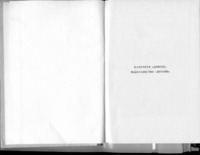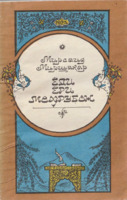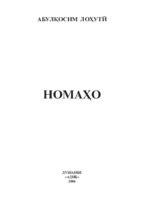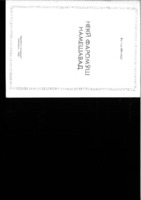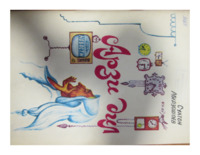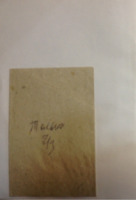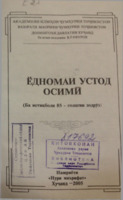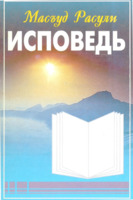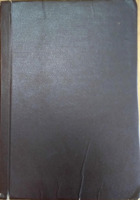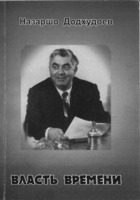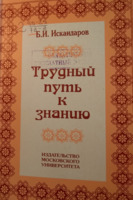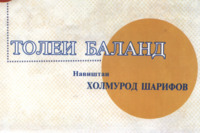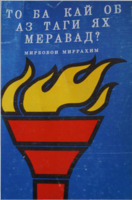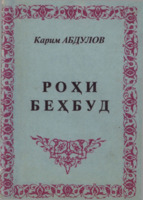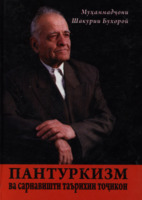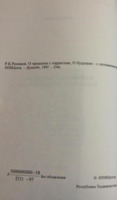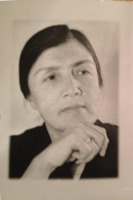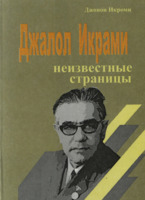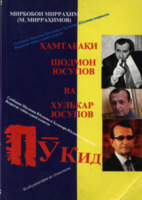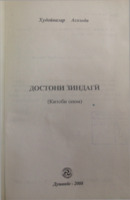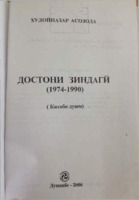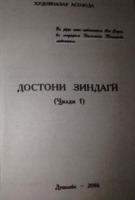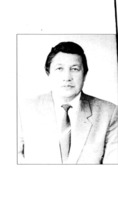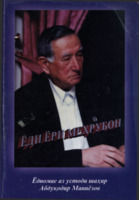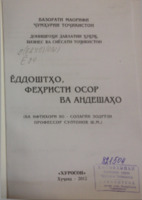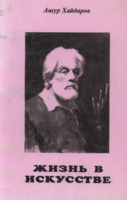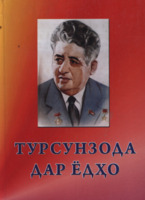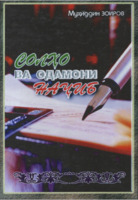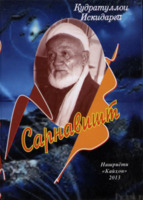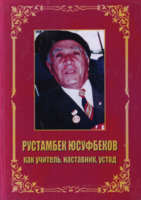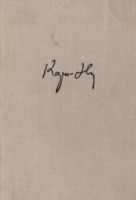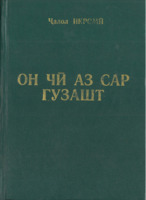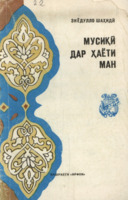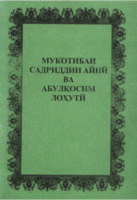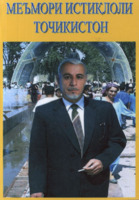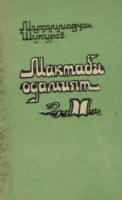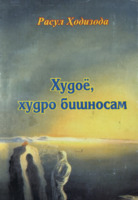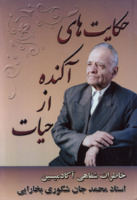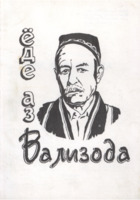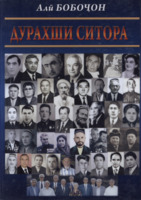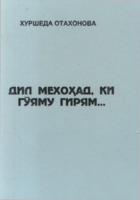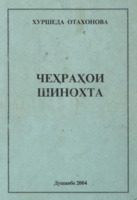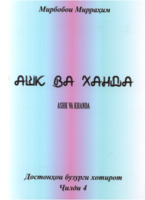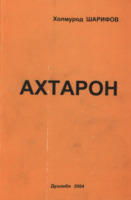Browse Documents (47 total)
Памяти Лахути In Memory of Lahuti
Abdulqosim Lahuti (1887-1957) was an Iranian/ Tajik writer. Forced to emigrate to the USSR for political reasons, he became a leading figure of Tajik letters and his works were translated into Russian and many other languages. This collection of essays about Lahuti's life and works was published in honour of Lahuti's posthumous 80th birthday, and includes works by Russian, Tajik, and other colleagues.
Ёди ёри мехрубон Memories of dear friends
From the publisher: Дар китоб хотира ва қайдҳои Шоири халқии Тоҷикистон, лауреати Мукофоти давлатӣ Мирсаид Миршакар аз ҳаёт ва эҷодиёти ходимони барҷастаи адабиёти советӣ гирд оварда шудааст.
Mirsaid Mirshakar (1912-1993) was a Soviet Tajik poet, writer, and government official. He was particularly known for his stories and poems for children, while his film work included Children of the Pamirs (1963). He was a member of the Central Committee of the Communist Party of Tajikistan, Chairman of the Supreme Soviet of the Tajik SSR (1961-1975), and chairman of the Tajik branch of Society for Solidarity with the Countries of Asia and Africa. This volumes includes reminiscences about other Tajik writers, among them Ayni, Lahuti, and Tursunzoda, as well as Russian writers like Kornei Chukovskii and Nikolai Tikhonov, and foreign writers such as the Punjabi novelist Gurbaksh Singh.
Номaҳо Letters
From the publisher: Ин китоб номаҳои то имрўз ба даст омадаи Абулќосим Лохутиро ба адибони тоҷик, ҳамдиёрон, дўстон, аҳли хонавода, хонандагон ва мухлисони ашъори ў дар бар кардааст. Номаҳо бо самимият, ҳарорати дил ва эҳтиром навишта шудаанд.
Abdulqosim Lahuti (1887-1957) was an Iranian/ Tajik writer. Forced to emigrate to the USSR for political reasons, he became a leading figure of Tajik letters and his works were translated into Russian and many other languages. This collection, assembled and annotated by Khursheda Otahonova, consists of letters written by Lahuti to writers in the USSR and abroad, including Sadriddin Ayni, Mirzo Tursunzoda, A. Dekhoti, and Romain Rolland.
Некӣ фаромӯш намешавад Kindness will not be forgotten
From the publisher: Устод Фаттоҳ Маҷидӣ баробари шеьргӯӣ дар наср ҳам қувва меозмояд. Ҳикояву воқеаҳои хурд-хурд менависад. Ӯ дар ин китоби "Некӣ фаромӯш намешавад" асосан дидаву шунидаҳои худро ба тарзи ҳикоятҳо ба қалам додааст, ки аксарияти онҳо аҳамияти калони ахлоқӣ, тарбиявӣ ва ҳатто таърихӣ доранд.
Fattoh Majidi (1931-) grew up in Samarqand and studied agriculture, eventually defending a doctorate and being appointed professor. He was also a poet. This short pamphlent consists of three parts. The first recounts episodes from his own life or of people he was close to; the second recounts episodes from literary and artistic life. The third consists of fictional or fictionalized vignettes.
Арзи дил The Heart's Desire
From the publisher:
Sulton Mirzoshoev (1932-2016) was a Tajikistani politician and cultural official active in the Soviet and post-Soviet era. Originally from the Danghara region, he was educated at the teacher's college in Kulob and later at the Higher Party School in Moscow. This collection inculdes his account of the case against Tajikistan's First Secretary Tursun Uljaboev, which Mirzoshoev witnessed as a leader of the republic's Komsomol, and various episodes from the history of the republic's film industry, including an essay on the director Boris Kimegerov.
Едномаи Мухаммад Осими Memories of Osimi
From the publisher: Едномаи шодравон Мухаммад Осимиро ашхоси гуногун—хешу ақрабо, дӯстону шогирдон, хамкорону ҳаммаслакон—олимони варзидаву шииохтаи тоҷик нигоштааид. Осимӣ солҳои тӯлонӣ сарварии яке аз фарҳангистонҳои бонуфуз — Акадеиияи илмҳои Чумхурии Тоҷикистонро бар ӯҳда дошт, аз ни рӯ, табиист, ки бештари муаллифони хотирот кормаидон ва аъзоёни ин боргоҳи илм мебошанд. Еддоштҳои олнмони арчманд лахлаҳои номаълуми хаст ва фаъолияти Осимиро ба хонанда равшанӣ сохта, барои тарҳрезии симои ин абармарди нотакрор ва фардн сарсурпурдаи роҳи илму фарҳанг кӯмак мерасоианд.
Muhammad Osimi (Osimov) 1920-1996, was a Tajik philosopher, educator, and government official. Born in Khujand, he was a graduate of the State University of Uzbekistan in Tashkent and saw service in Leningrad during the Great Patriotic War. He was the first rector of the Polytechnic Institute in Stalinabad (Dushanbe), and also served as Minister of Education. This volume is a collection of essays about Muhammad Osimi published by colleagues, students, and family members, including Rashid Rahimov and Iusufbek Rustambekov
Ёдномаи устод Осими (бо истикболи 85 солагии зодруз) Memories of Osimi
Muhammad Osimi (Osimov) 1920-1996, was a Tajik philosopher, educator, and government official. Born in Khujand, he was a graduate of the State University of Uzbekistan in Tashkent and saw service in Leningrad during the Great Patriotic War. He was the first rector of the Polytechnic Institute in Stalinabad (Dushanbe), and also served as Minister of Education. This selection is from a volume published on the 85th anniversary of his birth, but the scan only includes Osimi's own recollections about Sadriddin Ayni.
Ёдномаи Маҳмуд Воҳидов Memories of Mahmud Vohidov
From the publisher: Ин маҷмӯа — ёдномэи шоирон, нависандагон ва дӯстони шодра- вон Маҳмуд Воҳидов буда, аз ҳаёт ва эҷодиёти ин ҳунарпешаи номии тоҷик ҳикоят мекунад.
Mahmud (Mahmudjon) Vahidov (1939-1977) was a Tajik film and stage actor, who also toured internationally. A graduate of GITIS in Moscow, his profesional home was the Lahuti theater in Dushanbe. This volume is a collection of Vahidov's own reflections, as well reminiscences from fellow actors and other artists and intellectuals, including Loik Sherali, the historian Nizom Nurjanov, the writer Fazluddin Muhamadiev, and the film director Bension Kimegerov.
Исповедь Confessions
Dr. Masud Rasuli (1925 - 1996) was an important Tajik and Uzbek literary scholar, who lived and worked in Samarkand and Tashkent, Uzbekistan. He worked as the Head of the Russian Literature Department of the Institute of Language and Literature at the Uzbekistan Academy of Sciences. These memoirs cover the majority of the Soviet period, including his childhood. The book offers an insight into Central Asia's reformist jadid movement, many members of which were repressed during the Stalinist period.
Падидаҳои худшиноси ё саҳифаҳо аз дафтари хотира The ways of self knowing, or, pages from my journal
Mirboboi Mirrahim (Mirbobo MIrrahimov) is a translator and expert in pre-Islamic religions. During perestroika, he became famous for his writings on the Tajik language and was one of the first writers to publicly discuss the status of Samarqand and Bukhara. In this Tajik-language volume written during perestroika, Mirrahim presents events related to the publication and reception of his journalistic works based on his journal entries.
Власть времени The Power of Time
From the publisher: Публикуемые мемуары выдающегося государственного и общественного деятеля Таджикистана Назаршо Додхудоева (1915—2000) знакомят читателя с отдельными эпизодами и людьми, связанными с жизнью страны в наиболее интересный период новейшей истории Центральной Азии. Эти драгоценные свидетельства складываются в рассказ о судьбе паренька с далекого Памира, сумевшего благодаря несомненным качествам лидера, беззаветной любви к Родине и исключительному уважению к людям оказать влияние на развитие республики в середине XX столетия.
Nazarsho Dodhudoev (1915-2000) was a party and state official. Born in the Rushan district of what would later become the Gorno Badakshanskaia Avtonomnaia Oblast' (GBAO), he began his career as a teacher before joining the Komsomol and eventually the NKVD before embarking on a state and party career in Stalinabad (Dushanbe) and Moscow. He lost his position in the purge that followed the cotton scandal in Tajikistan in 1961. The memoir covers his childhood, education, the political effects of the purges, and his work under Bobojon Gafurov, Tursun Uljaboev, and others.
Трудный путь к знанию
The Long Road to Knowledge
From the publisher: Воспоминания крупнейшего советского востоковедад, академика АН Таджикистана Б.И. Искандарова - повествование о жизненном пути ученого, неустанном поиске знания и освоении "белых пятен" в истории Средней Азии, Памира и Гиндукуша. Автор рассказывает о трудной жизни в памирских кишлаках в 20-е годы, учебе в знаменитон ЛИФЛИ, участии в Великой Отечственной войне, многолетней работе в Институте истории АН Таджикистана (директором его Б.И. Исканадров был с 1962 по 1994 г.), встречах со многими замечательными учеными.
Bahodur Iskandarov (1912-2014) was a historian and head of the Institute of History of the Academy of Sciences of the Tajik SSR from 1962 to 1994. These memoirs cover his childhood in the Pamirs, his education in Leningrad, service during the Great Patriotic War, and epsidoes from his career as a researcher.
Толей баланд Great Fortune
From the publisher: Автор книги «Счастливая судьба» - ученый, писатель, общественный и государственный деятель Холмурод Шарифов рассказывает в публицистической форме о своих путешествиях во многие страны мира.
Holmurod Sharifov (1927-2017) was a Tajik-Soviet party and government official. Originally from the area of Panjikent, he and his family were resettled in the Vaksh valley in 1937; after 1946 he embarked on a career in the Komsomol and later in the Party. He eventually earned a kandidatskaia degree from the Academy of Social Sciences of the CPSU. He served as Deputy Minister of Culture and Central Committee Secretary for Culture of the Communist Party of Tajikistan from 1968-1979. He was also a member of the Soviet Committee for Solidarity with the Countries of Asia and Africa. This volume collects Holmurod Sharifov's travel writings, including his accounts of trips to Iran, Afghanistan, Cuba, Canada, and Bulgaria, as well as destinations within the USSR.
То ба кай об аз таги ях меравад? How Long will the Water Keep Flowing Under the Ice?
From the publisher: Ман сулоли "То ба кай об аз таги ях меравад?"-ро баъд аз дахуним сол такрор мекунам ва боз рӯ ба ҷомеа меорам. Ин мақолаҳо натиҷаи заҳматҳои хоксоронаи муаллиф дар роҳи худшиносии милиӣ мебошад. Ҳар яке аз онҳо боиси баҳсу вокунише дар ҷомаи Ҷумҳурӣ қарор гирифтаанд ва гувохи онанд, ки ин талошҳо дар роҳи Озодӣ ва Истиқлоли кишвар фаро расид.
Mirboboi Mirrahim (Mirbobo MIrrahimov) is a translator and expert in pre-Islamic religions. During perestroika, he became famous for his writings on the Tajik language and was one of the first writers to publicly discuss the status of Samarqand and Bukhara. He also became one of the cofounders of Rastokhez, Tajikistan's first independent political organization. This memoir, published during Mirrahim's exile in Iran, reprints a series of his articles, along with commentary and critique of the work of others.
Роҳи беҳбуд The path of improvement
From the publisher: «Рохи бехбуд» манмӯаи хотирот ва маколоти ҷомеашинос, иқтисоддон ва олими шинохтаи тоник - профессор Карим Абдулов мебошад.
Karim Abdulov (1939-2010) was a Komsomol and Tajik Communist Party functionary in the 1970s and 1980s. As a protege of Rahmon Nabiev, he was forced out of the Tajik Party apparatus in 1988, whereupon he took up an academic career. His memoir covers his years in the Tajik Communist Party leadership, as well as the events of perestroika.
Река времени: от Сталина до Горбачева The River of Time: From Stalin to Gorbachev
Nuriddin Mukhitdinov (1917-2008) was an Uzbek Soviet party official and later ambassador to Syria. A veteran of the great patriotic war, he became first secertary of the Communist Party of Uzbekistan under Khrushchev before becoming the first Central Asian to member of the Presidium (Politburo) of the Communist Party of the Soviet Union. This volume of Mukhitdinov's memoirs provides much more information about his time as ambassador to Syria as well as his relationship with Sharof Rashidov, Frol Kozlov, Aleksei Kosygin, and others.
Пантуркизм ва сарнавишти таръихии Тоҷикистон
Panturkism and the Rewriting of Tajik History
From the publisher: Китоби нави олими маъруф, академик Муҳаммадҷони Шакурии Бухороӣ «Пантуркизм ва сарнавишти таърихии тоҷикон» рисолаи «Фитнаи инқилоб дар Бухоро» ва силсиланигоштаҳои солҳои гуногуни муаллифро дар бар мегирад, ки посухест ба даъвоҳои бузургманишии олимону адибон, сиёсатмадорону фарҳангиёни туркгаро ва таҳрифгарони забону адабиёт ва таърихи фарҳанги тољик дар давраҳои гуногуни замони шуравӣ.
Muhammadjon Shakuri (Shakurov) (1924-2012) was a Tajik philologist and academician. He studied at the pedagogical institute in Dushanbe and later earned his kandidatskaia and doktorskaia degrees at the Institute of World Literature in Moscow. His professional home, however, remained the Rudaki Institute of Language and Literature in Dushanbe. In the late 1980s he became a leading figure in the campaign for the primacy of the Tajik language. This memoir revisits episodes from the late Soviet period related to perestroika and the reconsideration of the Soviet past, including the status of Samarqand and Bukhara. It also reproduces contemporary documents.
О прошлом с гордостью, о будущем с оптимизмом With pride about the past and optimism about the future.
Rashid Karimov (1932-) is a Tajik economist who spent 30 years as the head of the Institute of Economics of the Tajik SSR Academy of Sciences in Dushanbe. He played a leading role in the key economic debates of that period, as well as in organizing the research behind policy proposals adopted at the state level. This memoir covers his childhood outside of Leninobod (Khujand), his education in the post-war years, eventual graduate work in Moscow, and time in the institute. It also recounts stories about his family, including his sister I. R. Rakhimova, a leading party official.
Маткаби ман My School
From the publisher: Дар китоб мақола, очерк ва дигар эҷодҳои солҳои гуногуни муаллиф ҷамьоварӣ шудаанд. Асарҳои саргузашт ва мутоибоз бори аввал чоп мешаванд.
Munzifa Gafforova (1924-2013) was a philosopher and educator who served as rector of the Pedagogical Institute in Dushanbe from 1977-1988. Gafforova studied chemistry at the Kirov Pedagogical Institute in Leninabad, and by 18 was already working as an instructor there. She became a Komsomol activist, and by 1947, at the age of 23, was named head of women’s section of the Central Committee of the Communist Party of Tajikistan. Later she completed two graduate degrees, becoming a Doctor of Sciences in Philosophy. This volume includes her recollections of study, graduate work in Moscow, her reflections on gender (in)equality in the Soviet period and after, and her experience as rector.
Джалол Икрами: Неизвестные страницы Jalol Ikrami: Unknown Pages
Jonon Ikrami (1936-) is a chemist and the son of writer Jalol Ikromi. In these memoirs he recounts episodes from the life of his father, the Tajik author Jalol Ikrami. The memoirs cover the authors’ childhood, the 1937 purges, and Jalol Ikrami’s relationship with other Soviet and Central Asian political and literary figures like Sharaf Rashidov, Habibullo Nazarov, Mukhtar Auezov, Mikhail Zand, and Marietta Shaginyan. The memoirs complement Jalol Ikrami’s own memoirs.
Ҳамтабаки Шодмон Юсупов ва Хулькар Юсупов ПӮКИД.
The Union of Shodmon Yusuf and Khulkar Yusupov has come Undone
From the publisher: Ҳеҷ гоҳ бо чунин дилгарми дар навиштани посухе capгарм нашуда будам, чуноне ки дар як моҳи пас аз Наврӯзи соли 2011. Зеро ҳамин даҳ-понздаҳ соли ахир чандин китоб ва садҳо мақола дар мукобили андеша ва шахсияти Мирбобои Мирраҳим (Мирраҳимов) ба нашр расида, ки аксари онҳо қобили накд ва посух нестанд, аммо дурӯғпароканӣ ва тӯҳматномаи С. Мирзорахматов аз ҷинси дигар аст. Дар мавриди навиштаҳои С. Мирзорахматов метавон танҳо бо ибораи хеле зебои Ибни Ҳуққал (Ҳавқал) ифодаи матлаб кард, ки барҳақ дар сурату сирати ин қабил бузургворон мефармояд: «ишон пойбанд ба фазоили ахлоқӣ нестанд ва дар касби разоил бисёр ҳарисанд». Ба ҳар ҳол дурӯғпароканиҳои ҷаноби С. Мирзорахматов, боне шуд, ки дар посухҳо бо бурҳони қотеъ парда аз чеҳраи ҳақиқии он кас бардошта, шахсияти яке аз коргардонони асосии фоҷиаҳои хунини моҳи феврали соли 1990 барои касби мақоми аввал дар Тоҷикистонро дақиқ нишон дода, бисёр дигар иттилоот ва далелҳо дар боби таърихи худшиносии миллии тоҷикон ва умуман таърихи навин мисол оварда шавад, ки то ба ҳол аксарият аз онҳо огоҳ набуданд ва ё бархе аз таре ва барқасд аз онҳо иҷтиноб меварзиданд...
Mirboboi Mirrahim (Mirbobo MIrrahimov) is a translator and expert in pre-Islamic religions. During perestroika, he became famous for his writings on the Tajik language and was one of the first writers to publicly discuss the status of Samarqand and Bukhara. He also became one of the cofounders of Rastokhez, Tajikistan's first independent political organization.et and writer; during perestroika he was one of the founders of Rastokhez, Tajikistan's first independent political organization. He later was involved in the brief opposition-led government that controlled Dushanbe between May and November 1992. This work comprises a combination of memoir-like sketches of the late 1980s and early 1990s, as well as polemics directed at those rival politicians and authors that Mirrahim believes to have misrepresented fact in their own published works.
Mirboboi Mirrahim (Mirbobo MIrrahimov) is a translator and expert in pre-Islamic religions. During perestroika, he became famous for his writings on the Tajik language and was one of the first writers to publicly discuss the status of Samarqand and Bukhara. He also became one of the cofounders of Rastokhez, Tajikistan's first independent political organization.et and writer; during perestroika he was one of the founders of Rastokhez, Tajikistan's first independent political organization. He later was involved in the brief opposition-led government that controlled Dushanbe between May and November 1992. This work comprises a combination of memoir-like sketches of the late 1980s and early 1990s, as well as polemics directed at those rival politicians and authors that Mirrahim believes to have misrepresented fact in their own published works.
Годы проведенные в Кремле Years in the Kremlin
Nuritdin Mukhitdinov (1917-2008) was the Chairman of the Council of Ministers of the Uzbek SSR, First Secretary of the Uzbek Communist Party, and then member of the CPSU Politburo in the early 1960s. He later served as Soviet ambassador to a number of countries. This memoir covers his work in various Moscow-based positions, including in the Politburo.
Достони зиндагӣ (қ 3.) Stories of life (volume 3)
From the publisher: Дар ҷилди сеюм «Достони зиндагӣ» хотираҳои давраи донишгоҳи муаллиф бо сабки равону дилчасп қаламдод шудаанд. Дар ин китоб хонанда бо воқеаҳои сиёсивӯ фарҳангӣ ва иҷтимоии даҳ соли охири асри XX ва як қатор чеҳраҳои хотирмони ин солҳои пурошӯб ошно мегардад.
H. Asozoda (1941-2014) was a prominent literary historian and educator who served two tours as an interpreter in Afghanistan. This is the third volume of H. Asozoda's three volume memoir. It covers the post-Soviet period and the civil war.
Достони зиндагӣ ( қ 2.) Stories of life (volume 2)
From the publisher: Китоби мазкур аз боба фаъолияти илмиву омӯзгории адабиётшинос профессор Х. Асозода солҳои 1974-1990 дар Донишгоҳи давлатии Тоҷикистон нақл намуда, доир ба ҳаёти илмиву фарҳангй ва адабии зшон маводи зиёди арзишмандеро дар бар мегирад. Китоб барои доираи васеи хонандагон, олимон, омӯзгорон, томбилмон ва ихлосмондани илму адаб пешниҳод мегардад.
H. Asozoda (1941-2014) was a prominent literary historian and educator who served two tours as an interpreter in Afghanistan. This is the second volume of H. Asozoda's three volume memoir. It covers the perios 1974-1990, when he worked at the State University in Dushanbe. Note that his service in Afghanistan is covered in two separate volumes available here.
Достони зиндагӣ (қ. 1) Stories of life
From the publisher: Доктори илмиу филология профессор X. Асозода дар ҷилди якуми китоби хотироти худ ҳаёти тифливу наврасӣ, солҳои донишчуи аввалин қадамҳои дар ҷодаи илму маориф гузоштаи хешро бо забони шево ба риштаи тасвир кашидааст. Мутолиаи китоб барои доираи восеи хонандогон алалхусус барои онҳое ки омузиши ҳаёт ва эҷодиёт чеҳраҳои шинохтаи фарҳангиро пешаи худ қарор доданд, судманд хоҳад буд.
H. Asozoda (1941-2014) was a prominent literary historian and educator who served two tours as an interpreter in Afghanistan. This is the first volume of H. Asozoda's three volume memoirs. It covers his childhood, schooling in Kulob, studies in Dushanbe, and his graduate work. It is particularly useful for its description of university life in the 1960s, and the perspective it offers on the contrast between life in more provincial cities and in the capital.
H. Asozoda (1941-2014) was a prominent literary historian and educator who served two tours as an interpreter in Afghanistan. This is the first volume of H. Asozoda's three volume memoirs. It covers his childhood, schooling in Kulob, studies in Dushanbe, and his graduate work. It is particularly useful for its description of university life in the 1960s, and the perspective it offers on the contrast between life in more provincial cities and in the capital.
Дорогу осилит идущий The traveler will conquer the road.
From the publisher: Предлагаемая вниманию читателя книга по-своему уникальна. Ее автор - академик, профессор, Заслуженный работник Таджикистана Н.Х.Якубов более 16 лет являлся ректором Таджикского политехнического институт (ныне Таджикский технический университет). За эти годы им накоплен богатейший опыт педагогической научной, организационной работы. Под его непосредственным руководством в стенах этоге престижного вуза страны подготовлено немало талантливых специалистов. О них, о своих наставниках и о себе рассказывает Наим Холович в данной книге. Он - плод многолетних наблюдений и размышлений авторе о воспитании, преемственности поколений, о науке, призвании, верности избранной профессии и о миогол другом.
Naim Iakubov (1934-) is a Tajik architect and urban planner who was or many years the rector of the Polytechnic Institute in Dushanbe. This memoir covers his childhood and education in Stalinabad/Dushanbe in the 1940s, high education in Moscow during the 1950s, and his work at the polytechnic institute in the decades that followed. The memoir also discusses his family at some lengths, as well as the careers of his students and colleagues.
Naim Iakubov (1934-) is a Tajik architect and urban planner who was or many years the rector of the Polytechnic Institute in Dushanbe. This memoir covers his childhood and education in Stalinabad/Dushanbe in the 1940s, high education in Moscow during the 1950s, and his work at the polytechnic institute in the decades that followed. The memoir also discusses his family at some lengths, as well as the careers of his students and colleagues.
Ёди Ёри Меҳрубон
(Ёдномае аз устоди шаҳир Абдуқодир Маниёзов)
Memory of a beloved friend (recollections about the great teacher Abduqodir Maniyozov)
From the publisher: Калами донишмандону фархехтагони тоҷик тааллук дорад ва онхо ба шинохам яке аз чехраҳои азиз ва мӯьтабари Тоҷикистон, фарзанди хирадманд, устоди донишманду ровии нотакрор, узви вобастаи Академиям илмхои Ҷумҳури Тоҷикистон, узви пайвасгаи Фарҳангистони забои ва адаби форсим Ҷумхурии Исломии Эрон, сарвари фахрии Пажӯҳишюхи забои ва адабиёги баноми Рӯдакии Академиям илмхои Ҷумхурии Тоҷикистон, раиси Кумитан иҷроияи «Пайванд» Абдукодир Маниёзов бахшида шудаанд. Муаллифон зимни хотирот ва аидепгарони аз бехтарин сифатҳои инсонй ва халокияг, озодкорй ва озодандешии ин озодмарди ҷомеа, чехраи инсонй ва шарофати азалии устоди зиндаёд. кобилияти ташкилогчигии илмй ва хислатҳои огмфаи рохбарй ва шеьршиносиву сухандонии ровии забони тоҷикӣ ёд овардаанд. Ҳамчунин дар китоб аз хотироту ёддошт, таълифот ва тарҷумаи бадей, ки аз шуглхои пайвасгаи устод Абдукодир Маниёзов буданд, ба хонандаи азиз як-ду намуна пешкаш мешавад. «Ёди ёри мехрубои» бо ташаббус ва сарпарастии Сафорати Ҷумҳурии Исломии Эрон дар Ҷумҳурии Тоҷикисгон, шахсан бо дасттирии Сафири Кабири Ҷумхурии Исломии Эрон дар Ҷумхурии Тоҷикистон, ҷаноби окои доктор Алиасгар Амири Шсърдӯст ба нашр расидааст.
Abduqodir Maniyozov (1930-2008) was a Tajik philologist. Maniyozov was among the first graduates of the State University in Stalinabad (Dushanbe); from 1972-2000 he was the Director of the Rudaki Institue of Language and Literature. Maniyozov was also the deputy editor of the Tajik Soviet Encyclopedia. This volume collects reminiscences from colleagues and writers, including Ali Bobojon, Horsheda Otahonova, and Ibrohim Usmonov. It also includes short sketches from Maniezov’s unfinished memoirs, covering his childhood during the Great Patriotic War.
Ёддоштҳо, феҳристи осор, ва андешаҳо Memories, Events, and Signs of the Times
Shukur Sultanov (1932-) is a historian, and former deputy director of the Institute of Party History of the Communist Party of Tajikistan. In the late 1980s, he was also Minister of Higher Education of the Tajik SSR. This mixed Tajik/Russian language memoir includes his own recollections and those about him.
Жизнь в искусстве A Life in Art
Ashur Haydarov (1916-1988) was a Tajik artist. Born in Samarqand, he studied with Pavel Benkov, then went to work at the newspaper Lenin Yuli, where one of his colleagues was future First Secretary of Uzbekistan Sharof Rashidov. After the outbreak of war in 1941, Haydarov volunteered for service and was comissioned as a Second Liutenant. He was taken prisoner but escaped and joined partisan forces, eventually joining an NKVD detachment. After the war in 1949 Haydarov was arrested for supposed collaboration and imprisoned until 1955. He subsequently made a succesful aristic career but was not formally rehabilitated until 1989. The volume includes his (unfinished) memoirs, focusing on his youth, wartime service, and imprisonment, as well as articles from colleagues and friends.
Турсунзода дар ёдҳо Recollections about Tursunzoda
From the publisher: Мунодии сулҳу вассофи Ватан, шоири тавонову мураббии аҳли сухан ва яке аз муборизони фаьоли дӯстии халқхои олам Мирзо Турсунзода бо хислатхои наҷибонаю ашъори рангини хеш дар дили хамватанону хамкаламон абадан маскан гирифтааст. «Турсунзода дар ёдхо» дастагулест аз хотироти адибони бузурги олам ва дӯсзону аҳли қалам, ки ба муносибати 100-солагии ин сухансолори бузург пешкашатон мегардад.
Mirzo Tursunzoda (1911-1977) was a Tajik poet and writer, still recognized as one of the most important figures in 20th century Tajik literature. Many of his poems focused on anti-colonial themes. Tursunzoda held a number of important government posts, including chairman of the Soviet Committee for Solidarity with the Countries of Asia and Africa (SKSSAA), member of the Committee for Peace, chairman of the Union of Writers of the Tajik SSR, and a member of the Central Committee of the Communist Party of the Tajik SSR. This volume collects recollections from dozens of writers and colleagues, including Loiq Sherali, Aleksandr Dzasohov, Iosif Braginskiy, Gulnazar, and Rasul Gamzatov.
Mirzo Tursunzoda (1911-1977) was a Tajik poet and writer, still recognized as one of the most important figures in 20th century Tajik literature. Many of his poems focused on anti-colonial themes. Tursunzoda held a number of important government posts, including chairman of the Soviet Committee for Solidarity with the Countries of Asia and Africa (SKSSAA), member of the Committee for Peace, chairman of the Union of Writers of the Tajik SSR, and a member of the Central Committee of the Communist Party of the Tajik SSR. This volume collects recollections from dozens of writers and colleagues, including Loiq Sherali, Aleksandr Dzasohov, Iosif Braginskiy, Gulnazar, and Rasul Gamzatov.
Солҳо ва одамони наҷиб. (аз дафтари хотира). Interesting times and interesting people
Muhiddin Zoirov (1931-2018) was a Tajikistani Party and government official. Originally from the village of Laqqon in Badakhshan, he studied agriculture in Dushanbe before embarking on a Party career that saw him rise to the post of Minister of Agriculture of the Tajik SSR and First Secretary of Gorno-Badakshan party organization. This volume collects his thoughts on various state and Party figures he encountered in his career, including Jabbor Rasulov, Abdulahad Kakhorov, as well as many local officials, farm managers, and others. The volume includes over 40 pages of photographs from the author's collection.
Сарнавишт Fate
From the publisher: Қудратуллоҳи Искидарғи дар иигоштаҳояш бо номи «Сарнавишт» аз дидаву шунидаҳояш бозгӯ шудааст, ки паҳлӯуои норӯшани ҳаёти солиёни гузаштаи рӯзгорашро рушанӣ меандозанд.
Qudratulloi Iskidarghi (Sharifi Jamil Qudrati), b. 1927, was a longtime employee of the Tajik SSR's Committee for Radio and Television, and worked closedly from 1960s-1980s with many television and movie directors. Originally from the small village of Dargh near Aini, his memoir comments on his work and origins.
Рустем Юсуфебков как учитель, наставник, устод. Rustem Iusufbekov: teacher, mentor, professor.
From the publisher: Книга посвящена известному таджикскому ученому, политэконому, специалисту по экономическим проблемам образования, государственному деятелю, члену-корреспонденту АН Республики Таджикистан, заслуженному деятелю науки, доктору экономических наук, профессору Рустамбеку Юсуфбекову. Книга включает статьи о научной и творческой деятельности Рустамбека Юсуфбекова с основными датами жизни и деятельности, список опубликованных работ, работ, редактированных ученым, а также литературу о нем.
This volume is a collection of reminiscences about the educator and government official Rustem Iusufbekov (1923-2007). Originally from Ishakshim, Iusufebkov began his career as a schoolteacher before joining the communist party and later completing graduate work in economics, eventually becoming the head of the Political Economy department at the State University in Dushanbe. He then had a number of senior party and state positions, including Minister of Education of the Tajik SSR (1963-1974) and Deputy Chairman of the Council of Ministers of the Tajik SSR (1974-1984).
Размышленние о пройденном пути Reflections on the path I've walked
From the publisher: Эта книга — воспоминания одного из старейших ученых Узбекистана, Героя Социалистического Труда, члена Академии наук Узбекской ССР Т.Н. Кары-Ниязова. В основе ее содержится материал книги, вышедшей в 1967 году в Ташкенте под таким же названием. Готовя книгу к настоящему изданию, автор сделал дополнения. Он рассказывает о состоянии культуры в Туркестане в дооктябрьский период и о культурном и научном строительстве в Узбекской ССР . Читатель узнает о замечательных людях, с которыми автору пришлось вместе работать, о содружестве ученых разных национальностей, о их вкладе в развитие нашей Родины. В последней главе автор делится впечатлениями поездок в разные страны.
Tashmuhammed Niazovich Kary-Niazov (1897–1970) was an Uzbek educator, mathematician, and historian. This memoir, published during the Soviet era, covers his childhood in pre-revolutionary Central Asia, work as a teacher and educator after the revolution, involvement with the alphabet reforms of the 1940s, as well as his travels to Italy, Japan, Afghanistan, India, and Bulgaria. This is the second, expanded, edition, of a memoir that first appeared in Tashkent in 1967.
Он чӣ аз саргузашт
The stuff of memoirs
From the publisher: Ин китоби охирини Ҷалол Икромӣ мебошад. Нависанда дар бораи солҳои наврасиаш, хешу табораш, революсияи сосиалистии Бухоро ва сарнагун шудани республикаи сосиалистии Бухоро, тараққиёт ва сабзиши республикаи сосиалистии Тоҷикистон сухан меронад. Саҳифаҳои зиёде ба солҳои мудҳиши 1937-39 бахшида шудааст.
Jalol Ikromi (1909-1993) was one of Soviet Tajikistan's most famous writers. This memoir covers his childhood in Bukhara as well his eventual move to Stalinabad (Dushanbe). A substantial portion of the memoir is devoted to the effect of the great terror on his own family and on the intelligentsia more generally. The final pages contain his reflections on Perestroika and the collapse of the USSR.
Мусиқӣ дар ҳаёти ман Music in my life
From the publisher: Китоби «Мусиқӣ дар ҳаёти ман» доир ба мафҳуми мусиқӣ, таъсиру хосиятҳои он, роҷеъ ба фаъолияти бастакорони тоҷик ва марҳилаҳои инкишофи он маълумот медиҳад.
Ziyodullo Shahidi (1914-1985) was a Tajik musician, conductor, and composer. Originally trained in the Maqom tradition, Shahidi was recruited to the Moscow conservatory, where he studied with Aleksandr Lensky, Vladimir Fere, and Sergey Balasanyan - all of whom were involved in the project of "modernizing" indigenous musical traditions across the USSR. The volume collects Shahidi's essays on the music of other composers, as well as accounts of his initial recruitment, studies, work with the poet A. Dehoti, and other episodes from his career.
Ziyodullo Shahidi (1914-1985) was a Tajik musician, conductor, and composer. Originally trained in the Maqom tradition, Shahidi was recruited to the Moscow conservatory, where he studied with Aleksandr Lensky, Vladimir Fere, and Sergey Balasanyan - all of whom were involved in the project of "modernizing" indigenous musical traditions across the USSR. The volume collects Shahidi's essays on the music of other composers, as well as accounts of his initial recruitment, studies, work with the poet A. Dehoti, and other episodes from his career.
Мукотибаи Садриддин Айнӣ ва Абулқосим Лоҳутй. The correspondence of Sadriddin Ayni and Abdulqosem Lahuti
From the publisher: Ин китоб аз мактубҳои ду устоди бузург, Қаҳрамони Тоҷикистон Садриддин Айнӣ ва Абулқосим Лоҳутӣ фароҳам омадааст. Мактубҳо қимати илмиву адабӣ ва таърихӣ доранд.
This is a collection of correspondence between two of Soviet Tajikistan’s most prominent writers: Sadriddin Ayni (1878–1954) and Abdulqosim Lahuti (1887-1957). While both became part of the Tajik literary pantheon, neither had their primary residence in the republic. Ayni spent most of his life in Samarqand, while Lahuti lived in Moscow with his wife, Cecilia Bonu. These letters, held at the Archive of the Rudaki Institute of Literature in Dushanbe, were first published during the Soviet era. This second, more complete edition, includes additional letters from the period of the terror, when Ayni in particular was put under a great deal of pressure. The publication was prepared and edited by Khursheda Otahonova.
This is a collection of correspondence between two of Soviet Tajikistan’s most prominent writers: Sadriddin Ayni (1878–1954) and Abdulqosim Lahuti (1887-1957). While both became part of the Tajik literary pantheon, neither had their primary residence in the republic. Ayni spent most of his life in Samarqand, while Lahuti lived in Moscow with his wife, Cecilia Bonu. These letters, held at the Archive of the Rudaki Institute of Literature in Dushanbe, were first published during the Soviet era. This second, more complete edition, includes additional letters from the period of the terror, when Ayni in particular was put under a great deal of pressure. The publication was prepared and edited by Khursheda Otahonova.
Меъмори истиқлоли Тоҷикистон Architect of Tajikistan's Independence
From the publisher: Хонандаи гиромӣ, китобе, ки дар даст дорӣ, маҷмӯаест, аз навиштаҳои донишмандон ва журналистони шинохтаи кишвар аз рӯзгор ва пайкори шахсияти мубориз ва донишманду маорифпарвари машҳур Тоҳири Абдуцаббор, ки ба ҳангоми беморӣ ва даргузашти ин абармарди Тоҷикистон бунёдгузори эҳёи истиқлол ва мақоми расмии забони форсим тоҷикй дар замони нав ба табъ расидааст. Хамчунин дар ин маҷмӯа чанде аз навиштаҳои ин донишманд барои нахустин бор дар шакли маҷмӯа ба дам оварда шудааст.
Tohir Abdujabbor (1946-2009) is best known as the founder of Rastokhez (Rebirth), the first independent political organization in Tajikistan, which campaigned for the primacy of the Taiik language, greater political and economic autonomy and, eventually, independence. Abdujabbor trained as an economist, earning his kandidatskaia degree at the Institute of Oriental Studies in Moscow with a dissertation on Pakistan; he later served as an economic adviser and translator in Afghanistan. During the civil war he fled first to Tehran, later settling in Bishkek before returning to Tajikistan in 2005. Unfortunately, he did not leave behind any memoirs. This volume includes some insightful reminiscences about Abdujabbor by his former colleagues and associates, as well as some his key writings from the late Soviet period and beyond.
Мактаби одамият: Баъзе масъалаҳои адабиёт
ва маънавият.
The School of humaneness: some questions of literature and spirituality
Muhammadjon Shakuri (Shakurov) (1924-2012) was a Tajik philologist and academician. He studied at the pedagogical institute in Dushanbe and later earned his kandidatskaia and doktorskaia degrees at the Institute of World Literature in Moscow. His professional home, however, remained the Rudaki Institute of Language and Literature in Dushanbe. In the late 1980s he became a leading figure in the campaign for the primacy of the Tajik language. This volume collects a number of his articles on the relationship between literature, spirituality, and morality. It also includes several pieces recounting experiences with Sadriddin Ayni, Mirzo Tursonzoda, A. Dehoti, and Mirsaid Mirshakar.
Худое, худро бишиносам To know oneself and to know God
From the publisher: Олим ва нависандаи маъруф Расул Ҳодизода дар китоби хотироташ ҳамзамон бо тасвири марҳилаҳои зиндаги ва фаъолияти худ дар бораи воқеахри таърихии илму маданият ва симохри шинохтаи адабиёт, илм ва фарх,анги тоҷик хркоятхри ҷолиб аз диду дили худ нақл намудааст. Чунонки муаллиф гуфтааст, ин китоб "еде аз саҳифаҳои таърихи замой ва одамон аст", ки 6а хонандаи имруз тақдим мешавад.
Rasul Hodizoda (1928-2010) was a writer, translator, and scholar. Born in Samarkand, he studied in Tashkent, worked briefly in radio, and later did graduate work in Moscow. Hodizoda spent most of his career at the Rudaki Institute in Dushanbe, but was also active in the Union of Writers and published in all-union publications such as Druzhba Narodov. These particularly detailed memoirs cover his childhood, education, and career. Hodizoda also provides detail on his experiences writing a novel about Ahmad Donish and his relationship with mentors like Sadriddin Ayni, Mikhail Andreev, and Aleksandr Semenov, as well as contemporaries like Muhamadjon Shakurov (Shakuri), Shavqat Niezi, Semen Lipkin, and Mikhail Zand.
حکایتها آکنده از حیات Stories full of life
Muhammadjon Shakuri (Shakurov) (1924-2012) was a Tajik philologist and academician. He studied at the pedagogical institute in Dushanbe and later earned his kandidatskaia and doktorskaia degrees at the Institute of World Literature in Moscow. His professional home, however, remained the Rudaki Institute of Language and Literature in Dushanbe. In the late 1980s he became a leading figure in the campaign for the primacy of the Tajik language. This volume, published in the Arabic/Persian script with the support of the Iranian Embassy in Dushanbe, includes accounts of raising Tajik-speaking children in a mixed family (his wife was Russian), his experience studying for a graduate degree, and his perestroika-era activism.
Ёде аз Вализода Memories of Valizoda
From the publisher: Дар китоб ёдномаҳое гирд оварда шудаанд, ки ба калами олимон, шоиру нависандагон, дӯстону наздикони Саидалй Вализода мутааллиқанд. Китоб оммаи хонандагонро ба хислатҳои наҷиби ин адиб ва ҳунарманди халқи тоҷик шинос намуда,, аз мақоми хоси шоир дар таърихи адабиёти шифоҳии халқи тоҷик ва эътирофу қадршиносии мардум иисбат ба фарзанди баруманди халқ нақл мекунад.
Saidali Valizoda (1900-1971) was a Tajik poet, musician, performer, and educator. After working at a theatre in Stalinabad he returned to Hovaling, his home district, in 1938, where he worked at a boarding school (internat). He continued writing and publishing in the decades after the Great Patriotic War. This volume collects recollections about Valizoda and poems written in his honor by writers like Boki Rahimzoda, Jolol Ikramov, Abdusalom Dekhoti, and others.
Saidali Valizoda (1900-1971) was a Tajik poet, musician, performer, and educator. After working at a theatre in Stalinabad he returned to Hovaling, his home district, in 1938, where he worked at a boarding school (internat). He continued writing and publishing in the decades after the Great Patriotic War. This volume collects recollections about Valizoda and poems written in his honor by writers like Boki Rahimzoda, Jolol Ikramov, Abdusalom Dekhoti, and others.
Дурахши ситора (очерк ва мақолаҳо). Shining stars: sketches and articles
From the publisher: Маҷмӯаро мавзӯъҳое фаро мегирад, ки дар онҳо касбу пешаҳои мухталиф дар мисоли рӯзгору фаъолияти соҳибистеъдодҳо, номварону номбардорони сарзамини аҷдодӣ ба қалам омада, аз як тараф, мутолеонро аз бисёр ҷиҳат ба гузаштаҳои пурифтихорамон мешиносонанд ва аз ҷониби дигар, дастури боэътимоде ҳастанд пайи ҳадафқои шойиста хддоях кардани хонандаи имрӯз.
A collection of the journalist Ali Bobojon's sketches and articles about Tajik artists and writers.
Дил мехоҳад, ки гӯяму гирям My heart wishes for me to speak and to weep
From the publisher: Ин китоб аз ду қисм иборат буда, қисми аввал «Дил мехоҳад, ки гӯяму гирям” ном дорад. Муаллиф дар он хотираҳои айёми тифлӣ ва ҷавснии худро рӯйи коғаз овардааст, ки ба воқеаҳои соли 1937 марбут аст. Селоби хунолудаи даврони сталинй оилаи ин зиёии тоҷикро низ ба гирдоби худ кашида буд. Муаллиф ҳодисаҳоеро ёдовар шудааст, ки падари ғамхору меҳрубон ва модари мискину бенавояш аз сар'гузаронидаанд..У дар симои модар тоқат, матонат, сидиу вафо ва покии дили як нафар зани ба фоҷиаи мудҳиш рӯбарӯшудаи тоҷикро таҷассум намудааст. Қисми дуюм аз хотираҳо ва очеркҳои илмию оммавӣ иборат буда, фаъолияти илмию адабии чеҳраҳои намоёни илму фарҳангро фаро гирифтаанд. Инҳо Мирзо Турсунзода, Носирҷон Маъсумй, Муҳаммад Осимӣ, Аҳрор Мухторов, Раҷаб Амонов ва дигарон мебошанд.
Khursheda Otakhonova was a Tajik literary historian, known in particular for her work on Abdulqassim Lahuti and Sadriddin Ayni. The first part of these memoirs, initially published in Sadoi Sharq,discusses the effect of Stalin’s purges on Otakhonova’s own family. Her father, Otahon Musohojaev, joined the Komsomol in 1919 and became a Party member in 1923; he was arrested in 1937. Hursheda and her mother sought shelter in Istarafshan; her father was released in 1944 but was not rehabilitated until 1957. Later chapters cover the author’s experience with prominent intellectuals and literary figures, including Abduqodir Manyezov and Mirzo Tursonzade.
Чеҳраҳои шинохта Familiar Faces
From the publisher: Дар ин китоб паҳлуҳои гуногуни эҷодиёти чанд тан аз адибони барҷастаи муосири тоҷик, аз ҷумла Зуфархон Ҷавҳари, Садриддин Айнӣ, Абулқосим Лоҳутӣ, Пайрав Сулаймонӣ, Мирзо Турсунзода, Раҳим Ҷалил, Мӯъмин Қаноат ва дигарон мавриди баррасӣ қарор гирифтааст.
Khursheda Otakhonova (1932-2016) was a Tajik literary historian, known in particular for her work on Abdulqassim Lahuti and Sadriddin Ayni. This volume collects a number of articles by Khursheda Otakhonova on Tajik writers like Sadriddin Ayni, A. Lahuti, Mirzo Tursunzoda, Sotim Ulughzoda, and others. The second half of volume includes her personal recollections about Mohammed Osimi, Tursunzoda, Abdullojon Gafforov, Habibullohon Saidmurodov, and Suhayli Javharizoda.
Ашк ва ханда
Love and laughter
From the publisher: Зиндагии инсон миёни талхиву ширищо сипарй мешавад ва шояд мо кам ба он таваҷҷӯҳ дорем ва на ҳама вақт ба қадри он мерасем. Дар ишрищои зиндагӣ ёде аз талхщост ва дар талхиҳои он намакест аз ширищо. Лаҳзаҳое, ки зиндагии ман ва хонаводаам ҳамчун ашк дар сари мижгон меистод ва ҳар дам номулоиматщо ва нохушояндщое дар як сарзамини дигар бар сари бандаи гариб таҳдид дошт, ба тасвири талхиву ширищои рузгор ва кори баргардони ҳикматҳо ва латифаҳои беҳтарини дунё пардохтам ва он душворщоро бо хандаҳои гиряолуд ороставу пироста сохтам.
Mirboboi Mirrahim (Mirbobo MIrrahimov) is a translator and expert in pre-Islamic religions. During perestroika, he became famous for his writings on the Tajik language and was one of the first writers to publicly discuss the status of Samarqand and Bukhara. He also became one of the cofounders of Rastokhez, Tajikistan's first independent political organization. This volume of his memoirs, however, covers earlier years in the 1970s and 1980s and describes his experiences at university in Dushanbe, interactions with Tajik poets, and commentary on other writers' works.
Mirboboi Mirrahim (Mirbobo MIrrahimov) is a translator and expert in pre-Islamic religions. During perestroika, he became famous for his writings on the Tajik language and was one of the first writers to publicly discuss the status of Samarqand and Bukhara. He also became one of the cofounders of Rastokhez, Tajikistan's first independent political organization. This volume of his memoirs, however, covers earlier years in the 1970s and 1980s and describes his experiences at university in Dushanbe, interactions with Tajik poets, and commentary on other writers' works.
Ахтарон. Маҷмӯи ёддоштҳо Stars. Collected memoirs
From the publisher: Китоби нависанда Холмурод Шарифов “Ахтарон" асари ёддоштӣ буда, дар он муаллиф маҳорати нигорандагии худро бо нозукиҳояш намоиш додааст. “Ахтарон" нусхаи такмилёфтаи ёддоштҳои мусанниф “Оламафрӯзон" (Душанбе, “Маориф" 1992 ва “Ахтарони фарҳанг" (Душанбе, “Ирфон” 2002) буда, дар он иловаҳои зиёд ворид гардидаанд. Бахшҳои ёддоштӣ роҷеъ ба Суҳайлӣ Ҷавҳаризода, Мирсаид Миршакар, Раҳим Ҷалил ва Одина Ҳошим иловаҳои тозаанд. Ёддоштнависӣ аз жанрҳои душвори адабиёт маҳсуб ёфта, он диди хос, дарки амиқи матлаб, маҳорати фавқулоддаро дар масоили доги умдаи рӯз талаб мекунад. Омӯхтаву андӯхтаҳои муаллиф дар шакли ёддоштҳои ҷолибу хотирнишин ва латифу ҳикматангез рӯи когаз омадаву дар ҳамин китоби пурмӯҳтаво манзури хонандагони сершумор, хусусан омӯзгорон мегардад.
Holmurod Sharifov (1927-2017) was a Tajik-Soviet party and government official. Originally from the area of Panjikent, he and his family were resettled in the Vaksh valley in 1937; after 1946 he embarked on a career in the Komsomol and later in the Party. He eventually earned a kandidatskaia degree from the Academy of Social Sciences of the CPSU. He served as Deputy Minister of Culture and Central Committee Secretary for Culture of the Communist Party of Tajikistan from 1968-1979. He was also a member of the Soviet Committee for Solidarity with the Countries of Asia and Africa. This book collects previously published recollections about Soviet-Tajik cultural figures, including those he traveled with as part of official trips to Afghanistan, the USA, Canada, Bulgaria, and beyond. Among the many figures discussed in the book are Sadriddin Ayni, Mirzo Tursunzoda, the film director Boris Kimergerov, and Bobojon Gafurov.
